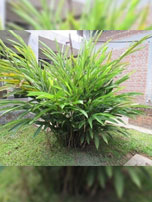SHAHEED KARTAR SINGH SARABHA AYURVEDIC MEDICAL COLLEGE & HOSPITAL
Affiliated to Guru Ravidas Ayurved University, Hoshiarpur Punjab
Affiliated to Guru Ravidas Ayurved University, Hoshiarpur Punjab

Botanical Name : Elettaria cardamomum Maton
Family : SCITAMINAE , Zingiberaceae.
Introduction :
Ela is famous for aromatic content in Indian Medicine and tradition. It shows abortifacient property
Names in different Indian languages :
English : Lesser Cardamom
Hindi : Elaci
Kannada : Elakki
Malayalam : Elam ,cittelam
Sanskrit : Ela,Trutih
Tamil : Elam
Telugu : Elakkayalu
Unani : Heel Khurd
Folk : Ilaayachi
Synonyms :
Elaa, Sukshmailaa, Kshudrailaa, Bhrngaparnikaa, Tutthaa, Draavidi, Prithvikaa, Triputaa, Truti, Upkunchikaa
Classification according to Charaka, Susrutha & Vagbhata :
Charaka
Svãsahara, Angamarda prasamana, katuka skandha,sirövirecana
Susrutha
Elãdi
Vagbhata
Elädi, Trijätaka, Cãturjãtaka
Varieties & adulterants – (CV – controversy, AD – adulterants) :
1. small
2. large – Ammomum subulatum.
3. Entada scandens. [CV]
4. Gardenia gummifera [CV]
Morphology :
A annual herb; rootstock thick, Leafy stem, 2.5 to 4 cm long.
Leaves— Oblong-lanceolate, pubescent beneath.
Flowers— in panicle (produced direct from the root stock). Bracts 2-3 flowered.
Flowers— shortly pedicel; calyx cylindrical, membranous, shortly lobed; corolla-tube ,lip larger than the corolla-segments, white sheathed with violet.
Fruit— subglobose or oblong capsules. Flowering and fruiting during May to July.
Distribution & Habitat :
Cultivated in Kerala, Tamilnadu and Karataka.
Chemical constituents :
cineole and alpha-terpinylacetate, with limonene, alpha-terpineol, sabinene, linalool.Bornneol, càmphene, p-cymene, geraneol, heptane, D-limonene, linalool, menthone, methylheptenone, myrcene, nerol, nerylacetate, a.- & 13-pinenes, saibenene, a- & -terpeneols, n-alkanes, ascaridole, camphor, citral, citronellal, farnesol, sitosterol, thujene etc
Properties :
RASA- Katu, Madhura
GUNA- Laghu, Ruksa
VIRYA- sita
VIPAKA- Katu
Note— Narahari described Ela dvaya as sita virya while Bhãvami quoted Brhat Ela as Usna virya.
Karma : Kapha-vatahara, sukra, näsaka, Dipana,Hrdya
Carminative antiemetic, stomachic, orexigenic, anti-gripe, antiasthmatic, antispasmodic, antiseptic
Indication :
Hrdroga,kasa, Svãsa, Mütra Krcchra, Chardi, Arsas, visarpa
flatulence, loss of appetite, colic, bronchitis, asthma, headache, gout
Part used :
Seeds, oil
Dosage :
Powder 2-4 g
External uses :
The oil of cardamom seeds is useful in the treatment of toothache.
Internal uses :
Digestive system : It is a mouth freshener, deodorant and antidipsetic. Seeds and oil are appetizer. digestive and laxative. A whole cardamum burnt in charcoal is a good carminative. It is useful in oral disorders, abdominal pain and piles. Antiemetic but Vagbhatta includes it in emetic class).
Circulatory system : Useful in general weakness.
Respiratory system : Because of its expectorant property, it is used in cough, asthma and other respiratory disorders.
Urinary system : Seeds are diuretic, useful in dysuria.
Temperature : Useful in burning sensation.
Important Yogas or Formations :
Eladi cürna, Eladiarista, Elädi Kasaya, eladi taila.
Therapeutic Uses :
(1) Hrdroga— Eala and Pippalimula are taken with honey (V.S.).
(2) Mutrakrcchra— Ela is given, along with Dadhi manda (water over the curd)— (G.N.).
(3) Timira— Ela powder is soaked in goats urine for three days and applied as collyrium (C.S.Ci. 26).
